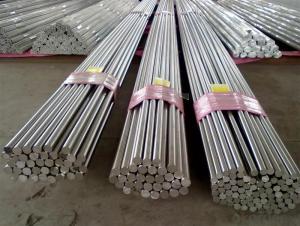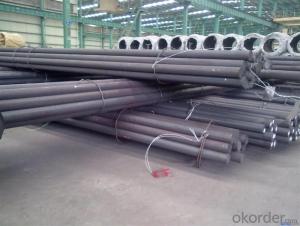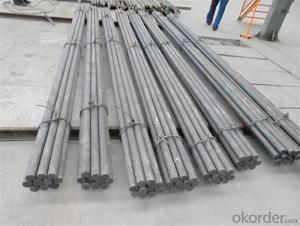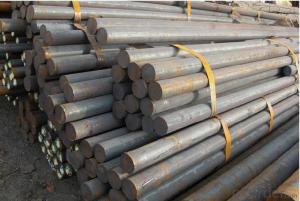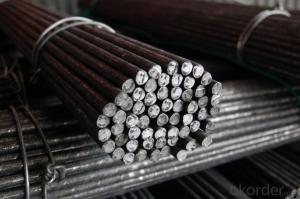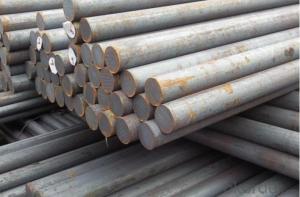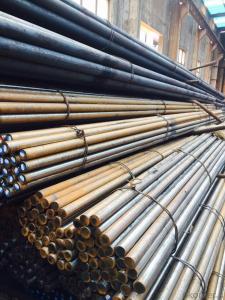SAE 1045 Carbon Steel Round Bars for Building
- Loading Port:
- Tianjin
- Payment Terms:
- TT OR LC
- Min Order Qty:
- 25 m.t.
- Supply Capability:
- 50000 m.t./month
OKorder Service Pledge
OKorder Financial Service
You Might Also Like
Item specifice
SAE 1045 Carbon Steel Round Bars for Building
Product Description:
1. Sizes: Diameter: 16mm-300mm; Length: 6m, 9m, 12m
2. Grade: 45#, SAE1045, S45C,C45
3. Invoicing on theoretical weight or actual weight as customer’s request
4. Shape: Round bar, solid bar of steel with circular section
5. Technique: Hot rolled, forged, cold rolled
Chemical Composition:
C | Si | Mn | P | S | Ni | Cr | Cu |
0.42-0.50 | 0.17-0.37 | 0.50-0.80 | ≤0.035 | ≤0.035 | ≤0.30 | ≤0.25 | ≤0.25 |
Packing and Delivery:
Packing in bundle with steel strips and shipped by break bulk vessel or container (depend on target market and different ports)
Delivery Detail: Approx.45 days
Usage and Applications:
1.SAE 1045 Carbon Steel Round Bars for Building is used in a large number of architectural and engineering structures. Or it can be used in construction of plants for the production of steel house frames, high-voltage transmission towers, bridges, vehicles, boilers, containers, ships, etc.
2. And we can use this kind of product on the performance of the mechanical parts if the demand is not very high.
3. Some especial material steel round bar can be used for main shaft of steamer, hummer shank, with big section and supper force.
Specification:
OD | Length | Material | Standard | Technique |
16-260mm | 6-12m or aques per request | 20# | GB ASTM DIN | Hot rolled |
16-350mm | 45# | |||
200-500mm | 45# | Forged | ||
20-250mm | 20Cr,40Cr,20-42CrMo | Hot rolled | ||
50-300mm | GCr15 |
Product show of C45 Steel
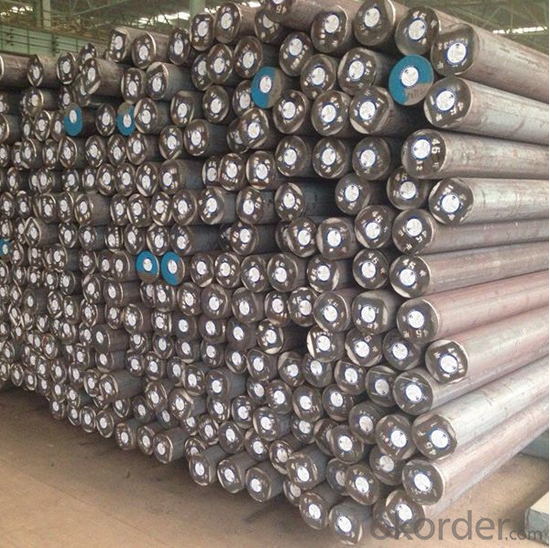
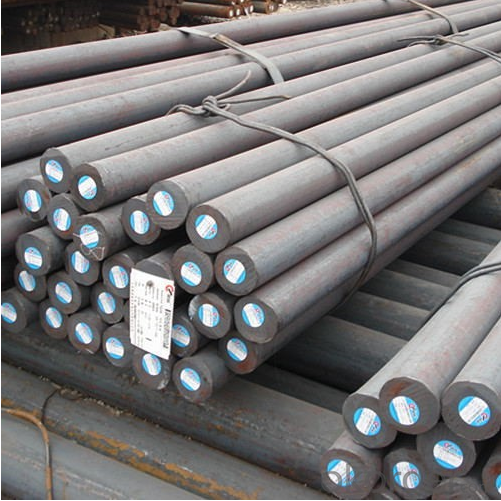
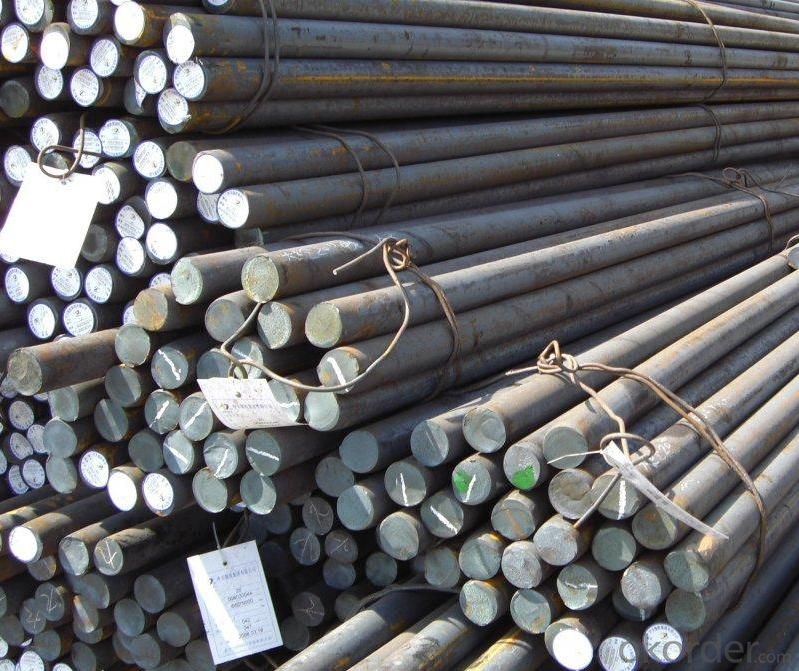
- Q:How is special steel used in the production of cutting inserts?
- Special steel is used in the production of cutting inserts due to its unique properties that make it ideal for this application. Cutting inserts are used in machining operations to remove material from a workpiece and shape it into the desired form. These inserts need to be able to withstand high temperatures, resist wear and abrasion, and maintain their sharp cutting edges for prolonged periods. Special steel, also known as tool steel, is specifically designed to meet these requirements. It is an alloy that contains various elements such as chromium, tungsten, vanadium, and molybdenum, which enhance its mechanical properties. Special steel has excellent hardness, toughness, and high-temperature resistance, making it suitable for cutting inserts. The special steel used in the production of cutting inserts undergoes a series of processes, including heat treatment, to further enhance its properties. Heat treatment involves heating the steel to a specific temperature and then rapidly cooling it, which adds strength and hardness to the material. This process helps to ensure that the cutting inserts can withstand the extreme forces and temperatures encountered during machining operations. Additionally, special steel can be coated with various materials, such as titanium nitride or diamond-like carbon, to further improve its performance. These coatings enhance the hardness, reduce friction, and improve the overall wear resistance of the cutting inserts, increasing their lifespan and efficiency. In summary, special steel is used in the production of cutting inserts due to its exceptional hardness, toughness, high-temperature resistance, and wear resistance. These properties allow the cutting inserts to withstand the demanding conditions of machining operations and maintain their sharp cutting edges for prolonged periods, resulting in efficient and precise material removal.
- Q:Can special steel be used in the production of surgical implants?
- Yes, special steel can be used in the production of surgical implants. Special steel, such as stainless steel, is often preferred for surgical implants due to its high strength, corrosion resistance, and biocompatibility. It is commonly used for various types of implants, including orthopedic, dental, and cardiovascular implants.
- Q:How does special steel contribute to the efficiency of automotive engines?
- Special steel plays a significant role in enhancing the efficiency of automotive engines in several ways. Firstly, special steel offers exceptional strength and durability, allowing for the production of lighter and more compact engine components. This reduction in weight helps to increase fuel efficiency as the engine has to work less to propel the vehicle, resulting in improved overall performance and reduced emissions. Moreover, special steel possesses excellent heat resistance and thermal conductivity properties. This is particularly crucial in automotive engines as they generate substantial heat during operation. By utilizing special steel in critical engine parts such as cylinder heads, valves, and pistons, manufacturers can effectively manage the heat generated, preventing engine overheating and ensuring optimal performance. Additionally, special steel is highly resistant to wear, corrosion, and fatigue, making it ideal for components exposed to high levels of stress and friction in automotive engines. This enhanced durability translates into longer engine life, reduced maintenance costs, and improved reliability. Furthermore, the use of special steel allows for the production of more precise and intricate engine designs. Its superior machinability enables the creation of complex shapes and structures, optimizing airflow and combustion within the engine. This leads to improved fuel combustion efficiency, power output, and overall engine performance. Overall, special steel's contribution to automotive engines' efficiency cannot be overstated. Its strength, heat resistance, durability, and machinability properties enable the production of lighter, more durable, and high-performing engine components. By integrating special steel into automotive engines, manufacturers can achieve enhanced fuel efficiency, reduced emissions, longer engine life, and improved overall performance.
- Q:What are the main advantages of using special steel in the oil and gas industry?
- The main advantages of using special steel in the oil and gas industry include its high strength, corrosion resistance, and ability to withstand extreme temperatures and pressures. Special steel is specifically designed to meet the demanding requirements of the industry, ensuring the integrity and reliability of equipment and structures. It also offers excellent weldability, allowing for efficient fabrication and installation processes. Overall, the use of special steel enhances safety, durability, and performance in oil and gas operations.
- Q:How does special steel perform in high-temperature oxidation with sulfur-containing atmospheres?
- Special steel performs well in high-temperature oxidation with sulfur-containing atmospheres due to its enhanced resistance to sulfur attack. The alloying elements present in special steel, such as chromium, molybdenum, and nickel, provide excellent protection against sulfur-induced corrosion and oxidation. This makes special steel an ideal choice for applications where exposure to high temperatures and sulfur-containing atmospheres is a concern.
- Q:What are the key alloying elements used in special steel?
- The key alloying elements used in special steel are typically chromium, nickel, molybdenum, vanadium, and tungsten. These elements are added in varying proportions to enhance specific properties such as corrosion resistance, strength, hardness, and heat resistance, making special steel suitable for various applications in industries like aerospace, automotive, and construction.
- Q:What are the different machining techniques used for special steel?
- Some of the different machining techniques used for special steel include turning, milling, drilling, grinding, and honing. These techniques are used to shape and finish the special steel according to specific requirements and tolerances. Each technique has its own advantages and is chosen based on factors such as the type of special steel, desired dimensions, surface finish, and the complexity of the part being machined.
- Q:How does special steel perform in low-temperature environments?
- Special steel, otherwise known as low-temperature steel, has been specifically designed to excel in environments with low temperatures. One of the main advantages of special steel is its exceptional ability to maintain its strength and toughness, even in extremely cold conditions. This is particularly crucial in industries like oil and gas, where equipment and structures are constantly exposed to extreme cold. When regular steel is subjected to low temperatures, it tends to become brittle and lose its mechanical properties, making it susceptible to cracking and failure. However, special steel is formulated with specific alloying elements such as nickel, chromium, and molybdenum, which enhance its performance in low-temperature scenarios. These alloying elements work to prevent the formation of brittle phases, allowing the steel to retain its toughness and ductility, even at sub-zero temperatures. Special steel finds extensive usage in cryogenic applications, where temperatures can plummet as low as -196 degrees Celsius (-320 degrees Fahrenheit). It is commonly employed in the construction of cryogenic storage tanks, liquefied natural gas (LNG) carriers, and other components that come into contact with extremely cold fluids or gases. In low-temperature environments, special steel not only maintains its mechanical properties but also exhibits remarkable resistance against corrosion. This is particularly crucial since low temperatures can exacerbate corrosion issues in many materials. The high nickel content present in special steel contributes to its corrosion resistance by forming a protective oxide layer that prevents the steel from corroding, even in harsh conditions. Overall, special steel has been purposefully engineered to withstand the challenges presented by low-temperature environments. Its ability to preserve strength, toughness, and corrosion resistance makes it an ideal choice for various industries that operate in extreme cold conditions.
- Q:How does special steel contribute to the electronics industry?
- Special steel contributes to the electronics industry by providing crucial components and materials that enhance the performance, durability, and efficiency of electronic devices. It is commonly used in the production of circuit boards, connectors, and various electronic components due to its excellent conductivity, heat resistance, and corrosion resistance properties. Additionally, special steel is utilized in the manufacturing of precision tools and equipment used in the production and assembly of electronic devices. Overall, special steel plays a vital role in ensuring the reliability and functionality of electronics, enabling advancements in technology and innovation within the industry.
- Q:How does special steel contribute to the construction of infrastructure projects?
- Enhanced strength, durability, and versatility are crucial attributes of special steel that play a vital role in the construction of infrastructure projects. Specifically tailored to meet the unique demands and challenges posed by these projects, special steel is an indispensable component for their successful completion. One of the ways in which special steel contributes to infrastructure projects is through its exceptional strength. Bridges, tunnels, and high-rise buildings, among others, require materials that can endure heavy loads and harsh environmental conditions. Special steel possesses high tensile and yield strength, enabling it to bear significant loads without experiencing deformation or failure. This strength ensures the structural integrity and safety of the infrastructure, providing reassurance to engineers, architects, and the general public. Durability is another key aspect that special steel brings to infrastructure projects. These projects often face exposure to various environmental factors, including extreme temperatures, moisture, and corrosive elements. Special steel is specifically designed to resist corrosion, oxidation, and degradation, making it highly durable and capable of withstanding challenging conditions. Its long lifespan reduces maintenance and replacement costs, making it a cost-effective choice for infrastructure projects. Versatility is yet another advantage of special steel in the realm of infrastructure construction. It can be customized and fabricated into different shapes and sizes to match the specific requirements of diverse projects. Whether used for beams, columns, or reinforcements, special steel offers flexibility in design and construction. This adaptability empowers engineers and architects to create innovative and efficient infrastructure designs, optimizing space and resources. Moreover, special steel contributes to the sustainability of infrastructure projects. Its recyclability and eco-friendly nature make it an environmentally responsible choice. Steel can be recycled without compromising its properties, reducing the need for new raw materials and minimizing waste. This sustainable approach aligns with the growing emphasis on eco-friendly construction practices, positioning special steel as an ideal material for infrastructure projects. In conclusion, through its superior strength, durability, versatility, and sustainability, special steel significantly contributes to the construction of infrastructure projects. Its ability to withstand heavy loads, harsh environmental conditions, and provide long-lasting performance ensures the safety and reliability of infrastructure. Additionally, its flexibility in design and construction allows for innovative and efficient project execution. With these advantages, special steel remains an essential component in the development of robust and sustainable infrastructure.
1. Manufacturer Overview |
|
|---|---|
| Location | |
| Year Established | |
| Annual Output Value | |
| Main Markets | |
| Company Certifications | |
2. Manufacturer Certificates |
|
|---|---|
| a) Certification Name | |
| Range | |
| Reference | |
| Validity Period | |
3. Manufacturer Capability |
|
|---|---|
| a)Trade Capacity | |
| Nearest Port | |
| Export Percentage | |
| No.of Employees in Trade Department | |
| Language Spoken: | |
| b)Factory Information | |
| Factory Size: | |
| No. of Production Lines | |
| Contract Manufacturing | |
| Product Price Range | |
Send your message to us
SAE 1045 Carbon Steel Round Bars for Building
- Loading Port:
- Tianjin
- Payment Terms:
- TT OR LC
- Min Order Qty:
- 25 m.t.
- Supply Capability:
- 50000 m.t./month
OKorder Service Pledge
OKorder Financial Service
Similar products
New products
Hot products
Hot Searches
Related keywords
